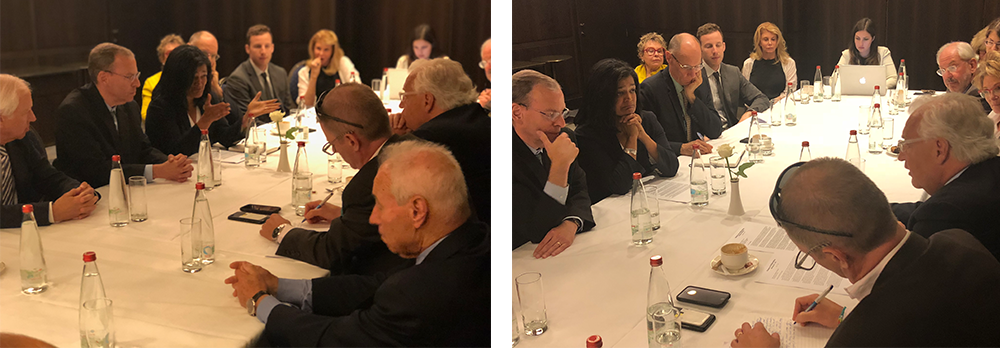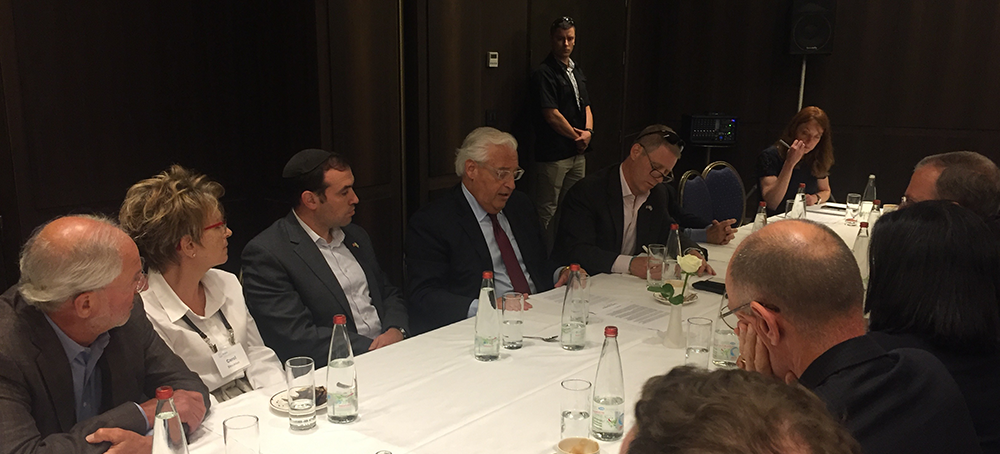- About Us
- Policy Center
- Learn
- Press Room
- Blog
- Get Involved
- Donate
- Donate to J Street Online
- Make a Gift in Someone’s Honor or Memory
- Make a Monthly Gift
- Tax-Deductible Donations
- Giving by mail
In his newly-released memoir, Sledgehammer, former US Ambassador to Israel David Friedman makes a number of unfounded and misleading claims – including several involving J Street. In particular, the book contains a number of concerning falsehoods about a meeting in Jerusalem that Ambassador Friedman held with the members of a J Street Congressional and Leadership Delegation in May of 2018.
In his book, Friedman describes an exchange with Congresswoman Pramila Jayapal. While describing comments made by the congresswoman about Israeli settlement expansion and the threatened demolition and displacement of the West Bank Palestinian village of Khan al-Ahmar, Friedman implies that the congresswoman compared Israeli policy with the Holocaust and the actions of the Nazis. He claims that he proceeded to lecture the congresswoman about the history of the Holocaust, that he directly rebuked J Street, and that he then stormed out of the meeting.
Friedman’s account of the meeting is false. More than ten J Street lay leaders and staffers who were present at the meeting, as well as detailed notes of the meeting that were taken at the time by a J Street staffer, recount an entirely different conversation.

In reality, a meeting between J Street’s delegation and the Ambassador did take place on May 30, 2018 at the David Citadel Hotel. Congresswoman Jayapal began the meeting with comments that raised concerns about Israeli settlement policies in the West Bank, noted that the threatened demolition of the village of Khan al-Ahmar would constitute a serious violation of international law, and urged the Trump Administration to take action to prevent such demolitions. While the congresswoman initially noted that earlier on their trip the delegation had visited the Yad Vashem museum, she made no comparison whatsoever between Israeli actions and the Holocaust or the Nazis.
In his response, Ambassador Friedman spoke openly and at length about his views on Israeli settlement policy, the history of the West Bank, and the particular circumstances of Khan al-Ahmar. He said nothing about the Holocaust; he made no rebuke of J Street; he did not storm out of the meeting in disgust. Instead, he stayed for a lengthy and respectful conversation about the policies of the Israeli government and the Trump Administration. On the issue of Khan al-Ahmar and the systemic displacement and demolition of Palestinian communities in the West Bank, he in fact promised to “raise it” with other relevant officials.

At the conclusion of the meeting, the ambassador was asked about offensive comments that he had previously made about J Street and its supporters, and how those comments contributed to a growing and harmful divisiveness in the Jewish community. He expressed regret and a desire to work together with J Street and others to address this divide and seek areas of common agreement.
While Friedman’s memoir gives an account of an incendiary and brief confrontation, the truth is that despite very clear and deeply-felt differences over policy, history and ideology, the meeting between the ambassador, Congresswoman Jayapal and the rest of the J Street’s delegation was in fact respectful and routine.
While a false but sensational story may help sell more books, it’s important to set the record straight.